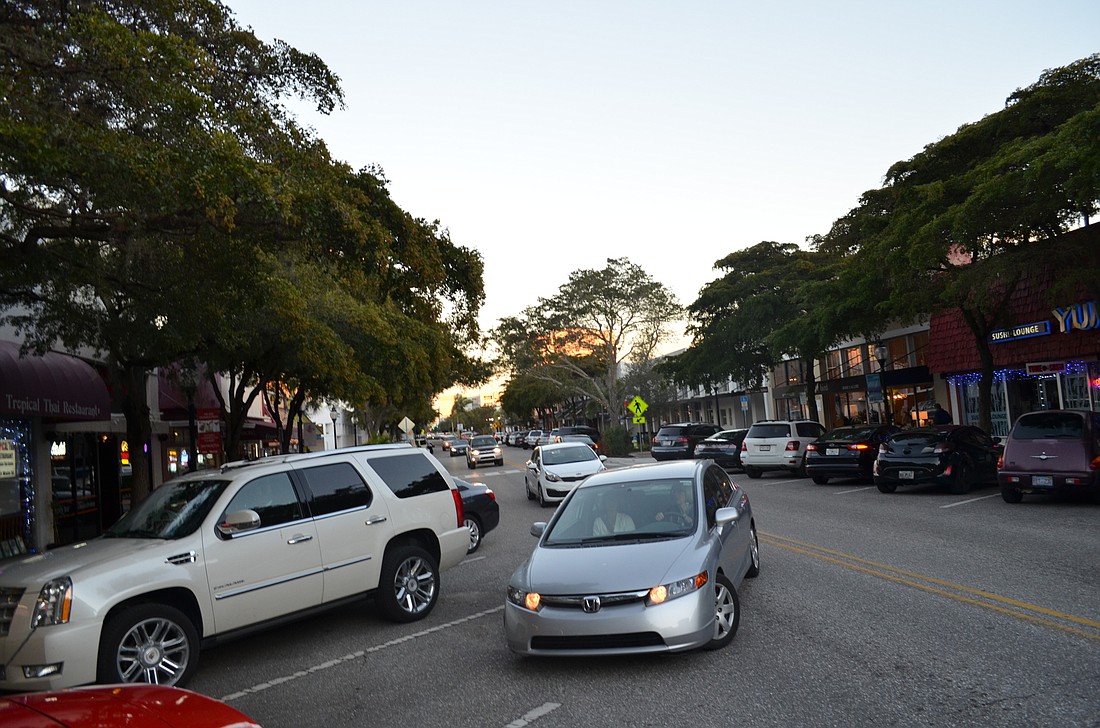- April 25, 2024
-
-
Loading

Loading

Twenty-one months ago, the city’s Parking Advisory Committee met for the last time.
The group, comprised of representatives from business districts throughout the city, was tasked with helping to develop a comprehensive parking management strategy. It was a response to the poor reception to the city’s previous attempt to implement paid parking.
City officials wanted to learn from the mistake and take a common-sense approach for managing its parking supply. Parking Manager Mark Lyons recognized Sarasota was lagging behind cities of its size in this regard, and the Parking Advisory Committee’s final report would help it catch up.
“The intent was to help us understand what took place and help provide me with information that would be useful in implement a citywide strategic plan,” Lyons said in a 2014 interview with the Sarasota Observer.
Today, the city has not formally adopted any comprehensive parking strategy. With the city’s parking fund running a $500,000 deficit annually, the City Commission has not discussed the final report of the Parking Advisory Committee.
That’s not to say the city has ignored the issue of parking for the better part of two years. Earlier this month, the City Commission discussed two new parking regulations. One instituted a maximum four-hour time restriction in city garages; the other created a $5 fee for using those garages during special event weekends.
This raised a red flag for those who had spoken with Lyons about the optimal strategy for managing parking. The consensus was that people should pay to use on-street parking, and the garages should serve as a free refuge for those who want to pass on premium spaces. Now, the only people who paid for parking in the city were garage users?
Eileen Hampshire, a member of the Parking Advisory Committee and a Downtown Improvement District board member, wondered why the city seemed to be willfully avoiding a substantive discussion of the issue.
“We’re not reinventing the wheel — everybody knows what works and what doesn’t work,” Hampshire said. “What doesn’t work is the chaos we have in parking now.”
Lyons didn’t reject that line of criticism. Although some DID members wondered if the city was afraid of broaching the unpopular concept of paid parking again, Lyons said that wasn’t the case for him. As the parking committee was finishing its work, he wasn’t shy about stating that the city needed to eventually implement paid parking.
Rather than framing it as a necessary budgetary evil, he evangelized on behalf of the concept. With a strategic approach, paid parking could reap widespread benefits — for businesses, for visitors to crowded segments of the city.
Still, Lyons doesn’t set the agenda for City Commission meetings. With no formal occasion to discuss parking management with the city’s policymakers, Lyons said, there wasn’t much room to implement change. As a result, he’s focused instead on increasing revenue and the level of service for parkers.
“I probably cannot disagree that it is counterintuitive,” Lyons said. “There should be more restriction and more concern with on-street parking before you get into the off-street areas. But until the opportunity is presented to share the full detail of the parking committee’s review, these are the conditions with which I have to work.”
City officials have cited packed agendas and turnover on the commission as contributing factors to the lengthy delay, but Deputy City Manager Marlon Brown took responsibility for the city’s failure to consider a comprehensive parking strategy to date.
“We haven’t taken the report of the Parking Advisory Committee to the commission,” Brown said. “Shame on us as staff. We need to do a better job of getting that information to them.”
Brown said staff is working to have that topic scheduled for a February or March commission meeting. On Tuesday, the DID unanimously endorsed a system with on-street paid parking and free garage parking, expressing concern about the lack of a comprehensive strategy to date.
The downtown group encouraged officials to have that discussion soon, emphasizing the urgency of developing a citywide plan for managing the parking supply.
“My angst is not paying to park; I’m not looking for free parking,” DID board member Steve Seidensticker said. “It’s a cohesive, comprehensive plan that the city leadership has to adopt.”